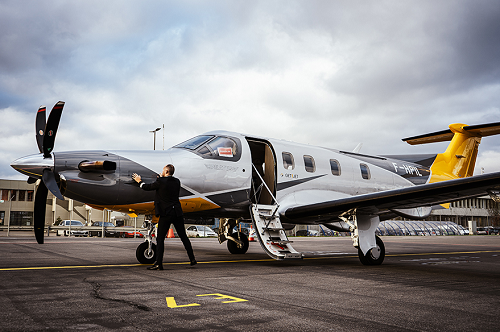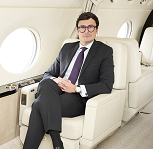LunaJets promotes the use of Spanish airlines in operating its flights to and from Spain.
Private jet charter flights, both for business and pleasure, have been LunaJets' main line of business since it was founded in Switzerland 17 years ago. By 2023, the company arranged over 14,000 flights to destinations around the world, with a management model that gives it access to 4,800 private aircraft and 350 commercial aircraft operators. Its main value lies in its ability to negotiate volume purchases, as well as access to aircraft that are not available to other buyers.
LunaJets' first office in Spain opened in 2024, and this year it expects to triple bookings, quadruple its customer base and increase its turnover by 131%. In 2025, it has also added two other lines of business to its core business: LunaGroupCharter, which leases customised commercial aircraft for groups and events, and LunaSolutions, which focuses on comprehensive aircraft acquisition advice.

What is your assessment of LunaJets' landing in Spain? Have expectations been met?
Very positive. Despite having a very strong and well-established brand in Central Europe and the Middle East, we landed in Spain with uncertainty about how the market would react to a brand that is not so familiar. The truth is that, although beginnings are never easy, we have found a national clientele that has appreciated our way of organising private aviation and which has embraced our arrival in Spain. Moreover, Spain’s geopolitical characteristics and idiosyncrasies make it ideal for testing this type of aviation at a very low price, even for personal travel.
What infrastructure do you have in Spain?
We specialise in brokerage and finding the right aircraft that best suits our clients’ interests; so, it is an asset-light business. As it stands today, we have a head office in Madrid, which includes a local operations centre that coordinates with a global operations centre in Riga (Latvia), and a regional office in Malaga. We also employ our own staff exclusively in Ibiza and Palma de Mallorca. Our sales team is available to travel to any part of the country to attend to any customer or potential customer who requires this. However, our intention is to continue to grow with more physical presence in other parts of the country. We are already actively working on projects to achieve this.
What is your customer profile in Spain?
Despite the clichés, it often comes as a surprise when I say that, especially in 2025, our customer base is much younger than you might imagine, and that corporate-professional and personal flights are almost 50/50. There is a logical explanation for this: on the one hand, prices for flying this way have fallen significantly in recent years and, on the other hand, this has made it accessible to upper-middle class families who value comfort and time savings. For example, it is not utopian to fly between Madrid and the Balearic Islands for around 900 euros per person, with a plane that adapts to your schedule and not the other way round, with catering of your choice, arriving at the terminal just 10 or 15 minutes before take-off time, with no queues or waiting, with pets travelling free on board, no baggage restrictions, et cetera. It is worthwhile. As far as LunaGroupCharter is concerned, the business is practically B2B, with travel agencies, corporations, tour operators and MICE events being the main source of revenue. But since we have access to 30-seat aircraft, more and more groups of family and friends are contacting us to charter their own commercial aircraft.
In addition to expanding your customer base, have you approached new suppliers to provide services at Spanish airports?
There’s no doubt about that. As a matter of fact, my baptism in this industry was as Commercial Director of the largest Spanish business jet operator, which is now a benchmark supplier for us. But this goes further, we encourage the use of local companies in operating our flights: handlers, catering companies, road transport companies, et cetera.
What have been your most important investments in Spain?
The most important investment is undoubtedly the one we have made in people, in their training and development. I can't think of a better investment.
How many employees does the Spanish subsidiary have?
We landed in Spain just under two years ago, with two employees. In April 2025, we already have 11 staff members, and in July we will have 13 or 14. We are all employees on permanent contracts; we believe strongly in our team and work to achieve their professional development so that they will remain with Luna Aviation Group for many years to come. To prove it: our current CEO joined the company as a Private Jet Advisor in 2016.
How important is Spain for the company's strategy?
It plays a key role in our growth plan. On the one hand, for the simple fact that it is a country with a long way to go in terms of chartering. Spain does not have an exaggerated concentration of trade and disposable income in its capital, and it has a network of very strong secondary cities which are not necessarily well-connected to the world by commercial airlines: this is where the aviation we propose makes sense. And also because it is the most sensible place from which to introduce the brand to the Latin American market, which is no small matter.
You have just launched two new business lines. What is the company's roadmap in Spain?
That's right: while LunaJets arrived in Spain in 2023, LunaSolutions only landed a few months ago and LunaGroupCharter has just been launched in 2025. Our idea is to build solid foundations on these two new lines, as we have already done in the seven other cities in the world where we have a presence. We understand that we must mature the brands, convey to the market what differentiates them from our competitors and begin to demonstrate our discourse with constant and frequent operations. It is time to sow our seeds.
Photos: LunaJets



